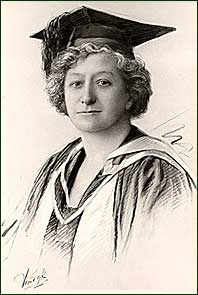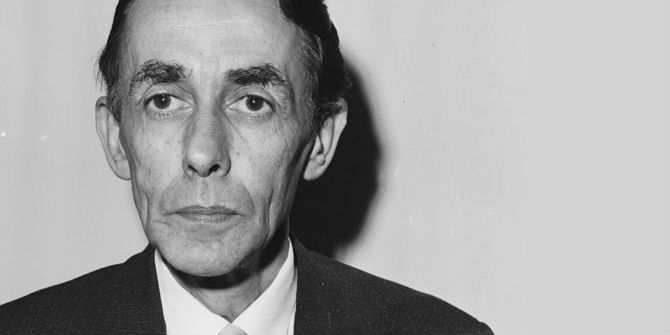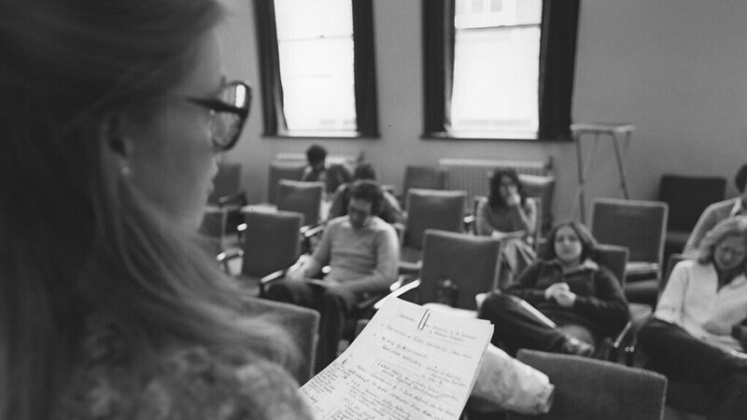LSE is a world-leading pioneer of the social sciences. Subjects like international relations, social policy, sociology, social anthropology, social psychology and criminology all have their origins as subjects of university study in the innovative work carried out by LSE academics. Here are a selection of examples from LSE’s early years.
Accountancy
Academic accountancy in Britain was pioneered at LSE by a series of influential academics who introduced and developed an economic perspective to the study of accounting.
In the 1920s it was taught in the Department of Business Administration by part-timers, first Lawrence Dicksee, who had been appointed Cassel Professor of Accounting and Business Methods in 1919, then FRM de Paula, who succeeded him in 1926.

When de Paula resigned in 1929, the Director of LSE, William Beveridge, appointed the economist Arnold Plant as Cassel Professor of Commerce. One of Plant’s greatest influences was the work of fellow LSE economist Lionel Robbins who has had a long-running impact on accounting thought in Britain, particularly in the analysis of the nature of cost and the theory of income measurement.
The important members of the Plant circle at LSE were the ‘three Ronalds’: Coase, Edwards and Fowler, who all produced seminal work exploring ways of applying economic theory to accounting. However, the economics profession in Britain in the late 1930s was more interested in the problems of the Great Slump.

The onset of the Second World War led to the temporary break-up of Plant’s group. After the war, the work of Coase and Edwards moved away from accounting, although they had a continuing personal influence on the new generation of accounting academics, the ‘LSE Triumvirate’ of William Baxter, Harold Eadey and David Solomons.

Professor Baxter, appointed in 1947, was the first full-time Professor of Accounting in Britain and made significant contributions to accounting theory in areas such as deprival value and the measurement standards applied to accounting, which have led to current developments in accounting standards. He and his colleagues sought to further develop accounting as an academic discipline, in keeping with well-established LSE academic traditions.

Professor Baxter’s research set the standard for challenging pre-conceived notions of accounting as purely an exercise in book-keeping. He made seminal contributions in accounting valuation and on the utility of accounting standards. In management accounting he originated the idea that allocating overheads might proxy for opportunity costs. His work has been used, challenged and revised by academics and practitioners across the public and private sectors, and indeed the work he did on deprival value in the 1970s is still being used by public utilities in the UK today. The foundations laid by Baxter, Eadey and Solomons still underpin the core of understanding about accounting that inspires much academic teaching and research, and increasingly practice.
Anthropology
Anthropology appeared for the first time at LSE in 1904 as a course on ethnology, established as part of the School’s new sociology degree. According to the LSE calendar for that year, it was aimed particularly at ‘Civil Servants destined for the tropical portions of the Empire, and Missionaries’.

In 1910, Charles Seligman was appointed lecturer (later professor) in ethnology. He lobbied to expand anthropology teaching and research and by the early 1920s he had increased the range of courses available. He had also secured a teaching post for his student, Bronislaw Malinowski, who first studied at the School in 1910.

Originally, anthropological study was based on an evolutionary approach in which human evolution and progress were key concepts. It studied anthropology in physical, archaeological, cultural, and linguistic terms. More than any other single figure, Malinowski developed social anthropology as a modern, fieldwork-based, social science for which functionalism provided a new theoretical foundation. This approach examines social institutions and accounts for the functional role they play in supporting the continuity of society.

Under the leadership of Malinowski, who became the first professor of anthropology in 1927, the School’s Department of Anthropology rose to prominence. The 1930s were an immensely productive decade, firmly establishing the department as one of the world’s leading anthropology research centres. Malinowski established his famous seminar for research students, who included several of the pre-eminent social anthropologists of the next generation: for example, Raymond Firth, EE Evans-Pritchard, Hortense Powdermaker, Isaac Schapera, Audrey Richards, SF Nadel, Fei Hsiao-t’ung, and Edmund Leach.

Following Malinowski (who died in 1942), Firth took over leadership of the department and, with his colleagues, steadily developed it during the post-war period, so that the range of teaching and research both expanded. Among the numerous PhD students who then studied in the department and later became leading professional anthropologists are Aidan Southall, Adrian Mayer, Ernest Gellner, Jean and John Comaroff, and Alfred Gell. Gell also taught in the department; he and Maurice Bloch, also on the staff, have been two of the most influential figures in modern anthropology.

Economic History
The first full-time lecturer in economic history at LSE, Lilian Knowles, was appointed in 1904: she was also the first in the country. She became reader in 1907 and took the chair in 1921.

Economics
LSE became the first specialist School of Economics in the world when it was recognised as a faculty of economics in the newly constituted University of London in 1900. Its economics degrees were the first university degrees principally dedicated to the social sciences.

AW (Bill) Philips pioneered the Phillips Curve that has proved instrumental in the understanding of government economic policy on employment and inflation.
Lionel Robbins and William Beveridge were also key influences in the development of economics whose involvement in the outside world was substantial.

Some of the world’s most influential economists can be found among the 11 academics associated with the School who have won Nobel prizes for their groundbreaking work in this subject.
Sir John Hicks, awarded the prize in 1972, developed the Hicks-Hansen IS-LM model, now a standard macroeconomic Keynesian starting point for all university economists.

The economic liberalism of Friedrich Hayek, who won the prize in 1974, came to define the radical free-market policies of Margaret Thatcher and Ronald Reagan in the 1980s. Implementation of his philosophy led to a reduction in unionisation and contributed to the political backdrop of the collapse of communism in Eastern Europe. Hayek’s famous debates with John Maynard Keynes still shape the two major schools of economic thought today as nations attempt to balance the merits of a free market economy versus interventionist government policy.
Other Nobel winners include James Meade for his pioneering work on trade theory, and Sir William Arthur Lewis who developed the Dual Model of the economy that eventually became the foundation of much economic industrialisation theory.
Merton Miller was also recognised for his seminal work in the theory of financial economics, and Ronald Coase for his discovery and clarification of the significance of transaction costs and property rights for the institutional structure and functioning of the economy.

Amartya Sen’s contributions to development economics, including pioneering studies of gender inequality, won him the prize in 1998.
Other prize-winning economists whose main careers have been elsewhere, but who have had strong links with the School, include Robert Mundell, George Akerlof, Leonid Hurwicz and Paul Krugman.
Law
Law at LSE was pioneered as an academic subject and a branch of the social sciences. Many important aspects of law were first taught and examined systematically from an academic perspective at the School. These include banking law, taxation law, civil litigation, company law, labour law, family law, aspects of welfare law, and studies of the legal system and the legal profession. These subjects, and many others, have since become central to the concerns of lawyers and researchers.
Harold Cooke Gutteridge was the first incumbent of the Cassel Chair of Commercial and Industrial Law in 1919, and was succeeded by Theo Chorley who became a key figure in the promotion of social reform and progressive causes, both within and outside the legal profession. Throughout his life he advocated a closer relationship between practitioners and academics that eventually inspired a complete overhaul of the English system of legal education.

It was in the 1930s and 1940s, influenced by Chorley and then by exiled Jewish lawyers from Germany, notably Otto Kahn-Freund, that the School’s Law department acquired its distinctive character as one where lawyers were not ashamed to describe themselves as social scientists.
Chorley and other LSE members were prominent among the founders of the Modern Law Review, established in 1937 as an academic forum for the critical examination of contemporary legal issues. The British legal establishment often saw the journal as a threat to institutional order, regarding its reformist nature and discussion of wider social issues as subversive. Despite this, the journal quickly achieved an international and influential role at the forefront of legal scholarship.

In 1950, the Review published Jim Gower’s inaugural lecture at LSE on the subject of English legal education in which he mounted an unprecedented attack on almost every aspect of the subject and called for an outside inquiry. He identified defects in the system of training and called for a requirement that every solicitor and barrister should take a university law degree. This was accompanied by a call for a less deferential approach towards judges’ decisions. It contributed greatly to the movement towards an all-graduate profession, a general expansion in university legal education and major reforms in the legal profession.
Social policy
Social policy has its roots in the department of Social Science and Administration which was founded in 1912, the fruit of a marriage between a school for social workers and a poverty research unit financed by an Indian millionaire.
The preceding two decades had seen an explosion of public interest in questions of social theory and social policy. Major changes had occurred in the administration of the poor law, in provision of new social services, and in the scope and variety of voluntary institutions. Poverty, malnutrition, infant mortality, bad housing and other social problems were increasingly seen as diseases of the body politic and not just misfortunes for the individual. The foundation of LSE was an important symptom of these new currents of thought, and of optimistic hopes about their relevance to practical problems.

The Charity Organisation Society’s School of Sociology, which had been training social workers in the theoretical implications of their calling, was absorbed into LSE’s new department of Social Science and Administration after Ratan Tata, a wealthy industrialist, agreed to fund a research unit to investigate methods of preventing and relieving poverty and destitution. His offer to fund a similar project in his native India had been declined for political reasons.
The department’s first head was Professor EJ Urwick, a founder member and vice-president of the Sociological Society. He almost certainly recruited RH Tawney and together they became the two key figures who both reflected and determined the character of the Social Administration department until the advent of TH Marshall after the end of the Second World War, followed by Richard Titmuss in 1950.

The department became one of the most important influences in establishing social policy and administration as a field of study in British universities, particularly in the quarter of a century between 1945 and 1970. The influence of Titmuss, who held the Chair in Social Administration from 1950 to 1973, may perhaps be compared to that of Keynes in economics or Popper in social philosophy. Titmuss gave the subject academic visibility and wide social relevance at a time when the School was influencing most of the social policies of the 1960s and 1970s in Britain.
The subject has changed radically in the last 30 years, exploding its original boundaries, both intellectual and geographical.
Sociology
LSE offered the first sociology course in any British University in 1904. It has since played a unique historical role in defining and developing the discipline, nationally and internationally.
Edvard Westermarck became Britain’s first professor of sociology, closely followed by Leonard Trelawny Hobhouse, when they jointly held the Martin White Chair at LSE from 1907. Both men were pivotal in the establishment and foundation of sociology as an academic discipline and in the refinement of its methodology.

After Hobhouse died in 1929, the tradition of sociology at LSE continued with Morris Ginsberg, who succeeded him to the Martin White Professorship, and the continued support of Westermarck.
Moral evolution was maintained as the central theme, but the appointments of TH Marshall and David Glass led to the development of empirically informed sociological analysis, of which Marshall’s 1950 lectures on Citizenship and Social Class were classic examples. A Professor of Sociology, David Glass, was elected to the Royal Society in 1971, a rare distinction for a social scientist.

The combination of Ginsberg’s ‘evolutionary sociology’, Marshall’s ‘citizenship sociology’, and Glass’s ‘political arithmetic’ together with student demand for the subject and funding from the Rockefeller, Nuffield, and Skepper foundations, converged to make LSE a pre-eminent institution for sociology in the early post-war period.

The department founded the British Journal of Sociology, publishing the first issue in 1950. LSE sociologists produced the Nuffield-sponsored Social Mobility in Britain in 1954, the product of a five-year research project that established the centrality of the study of social stratification for the next 20 years.
The 1960s saw the rapid expansion of sociology as its own discipline in British higher education, with many of those leading this expansion being LSE-trained or having LSE connections.
Sociologist Anthony Giddens, a former LSE masters student and director of the School 1997- 2003, has had a profound impact on modern politics. As an adviser to Tony Blair, it was Giddens’ ‘third way’ political approach that helped to engineer the evolution of New Labour. Giddens also took part in the original Blair-Clinton dialogues from 1997 onwards.

The department contributed greatly to the development of the discipline, and its application of quantitative methods to economics and economic theory in the 1930s led to the emergence of econometrics.
Read more
Social Psychology in the 1960s
Women at the front: pioneering LSE teachers
This blog is an abridged version of ‘Pioneers of the social sciences‘ on the LSE website.





